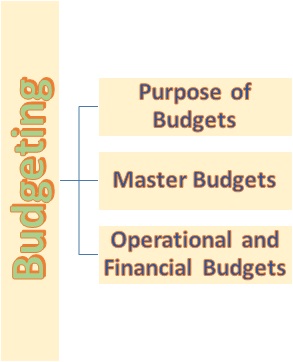Operational and Financial Budgets
Operational Budgets
Operating budgets are made after the sales budget is made. The sales budget includes the projected revenues from the sales of goods or services offered by the given company. The operating budgets are made from the operational activities of a given company. The operations budgets can take different forms depending on the sector or industry.
The most common operating budgets are:
1. Sales budget
2. Cash budget
3. Administrative budgets
4. Production budgets
5. Cost of goods sold budget
Note: The operating budgets are related directly to the activities or materials that create revenue for the company.
Financial Budgets
Financial budgets are made after the operating budgets have been made. The operating budgets provides the estimated costs and projections of all relevant materials and activities related to creating revenue. After all the projected costs have been identified and the operating budgets made, the accounting manager makes the final parts of the master budget - the financial budgets.
The financial budgets are actually replicas of the financial statements, the only difference is that they are based on projected data and not actual data. The budgeted financial budgets should be compared with actual financial statements prepared at the end of the period to measure a company's performance.
The financial budgets are made from the data in operating budgets of a given company
The most common financial budgets are:
1. Budgeted balance sheet
2. Budgeted income statement
3. Budgeted cash flow statement
Note: The financial budgets provide a close replica of the expected financial statements of a given period.
Flexible Budgets Versus Static Budgets
Managers usually update their budgets rather than waiting and relaying on the same budget until the end of a period. This helps them to stay current with their approximations especially when some important things change such as prices of materials, salary increases, sales increase/decrease, or when the economic conditions change.Flexible budgets are thus budgets that reflect the current projections taking into consideration the current situations.
Static budgets on the other hand are budgets which remains unchanged until the end of the accounting period.

